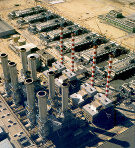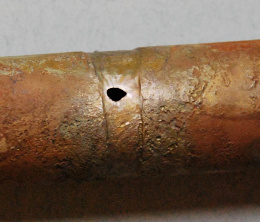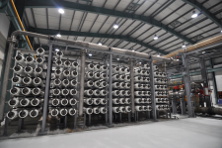Failure Investigations
Dr Francis has looked at failures of heat exchanger tubes from thermal desalination plants, in many different locations. These have covered mostly copper alloys and some of the corrosion problems have been internal, while others have been external. In all cases it has been possible to make recommendations about plant operating conditions and/or practices to prevent a re-occurrence.
Other failures have been with heat exchanger tube sheets, pumps or valves, covering a range of materials of construction. In all cases it has been possible to explain to the plant operator how to avoid future failures.
Failure examinations in SWRO plants have covered piping, pumps, filter vessels and valves. These have all involved duplex stainless steels, with a variety of reasons for the failures.



 External corrosion of 90/10 Cu-Ni tube from the heat recovery section of an MSF plant
External corrosion of 90/10 Cu-Ni tube from the heat recovery section of an MSF plant